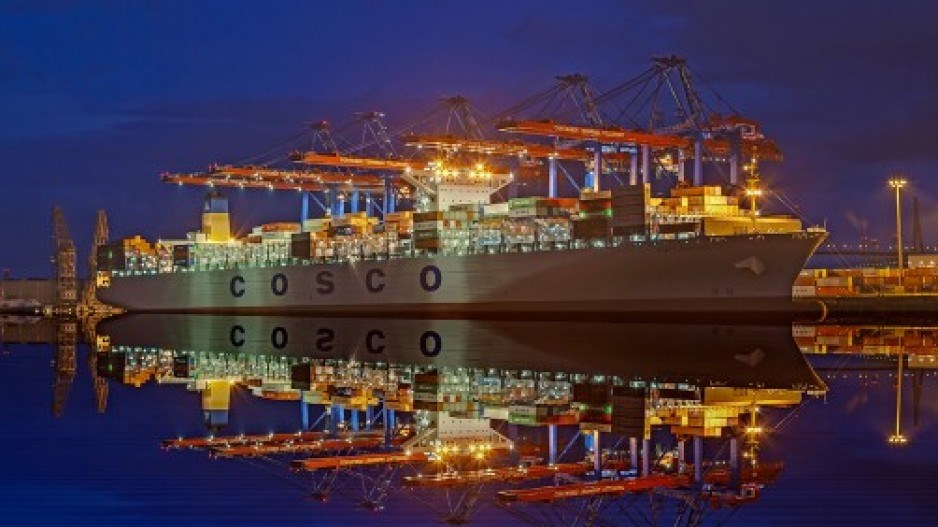The consortium behind a takeover bid targeting the parent company of Vancouver-based Seaspan, the world’s largest lessor of container ships, has upped the ante in its push to take Atlas Corp. (NYSE:ATCO) private.
Poseidon Acquisition Corp. announced Monday that it had increased its bid price to acquire all of the outstanding shares of Atlas that the consortium does not own or control to US$15.50 per share. Its original per-share offer was US$14.45 on August 4 and included a 30 per cent premium over Atlas’ share price prior to the announcement.
The Atlas board of directors subsequently appointed a special committee made up of independent directors of the board to consider Poseidon’s original proposal. However, the committee subsequently informed the consortium that it was not prepared to recommend the US$14.45 per-share proposal to Atlas shareholders because “it did not reflect the standalone value of the company.”
The committee confirmed receipt of the revised Poseidon offer on Wednesday and notified the consortium that, working with advisers, it was evaluating the proposal.
News of the increased bid price pushed the share price for Atlas up eight per cent in pre-market trades on Monday.
Poseidon Chairman David Sokol said the increased bid price represents the consortium’s final and best offer.
Atlas has a market cap of approximately US$3.5 billion, but Seaspan generates the bulk of its parent company’s revenue.
The Poseidon consortium includes Sokol, who is also the chairman of the Atlas board of directors, affiliates of the Washington family, affiliates of Fairfax Financial Holdings and Ocean Network Express, the world’s sixth largest maritime container shipping company.
Together, they own more than 50 per cent of Atlas’ outstanding common shares.
The target of the takeover bid continues to post impressive numbers, especially when it comes to Seaspan’s contribution.
Second-quarter revenue for Atlas was US$413 million, which was up 4.9 per cent from the same quarter in 2021. Net income was up 2.6 per cent to US$279.5 million; US$252.4 million of that income was generated by Seaspan.
Atlas subsidiary APR Energy, the world’s largest mobile gas turbine fleet owner and operator, generated US$27 million in the quarter.
Seaspan’s operating containership fleet has grown to 134 from zero in 2001. It also has 67 ships under construction and will have an operating fleet of 201 ships with a total carrying capacity of 1.95 million 20-foot equivalent units (TEUs) when Seaspan’s newbuilds are delivered.
It celebrated its 20th anniversary late last year with third-quarter financials that included profit up 31 per cent to US$256 million compared with the same quarter in 2020.
In an August 4 Securities and Exchange Commission filing, Sokol stated that “the Consortium believes the proposed transaction will provide Atlas’ common shareholders with immediate liquidity and certainty of value at a significant premium to the current share price, while allowing Atlas to focus on the long term without the emphasis on short-term results and providing Atlas with an ideal strategic partner to support its future growth.”
The Poseidon push to acquire Atlas comes at a time of massive profits in the global container shipping sector. Those profits for 2022 are on track to hit US245 billion, according to Blue Alpha Capital founder John McCown.
The result of container shipping carrier companies having all that cash in hand, according to Drewry, a U.K.-based shipping consultancy, will be increased container shipping company investments in new ships and an increase in their ownership percentage of the global container fleet.
John Fossey, Drewry’s senior analyst for container equipment, estimated in a recent report on global container shipping equipment, that ocean carriers will increase their share of the global fleet to over 50 per cent this year and next and that container ship leasing companies’ share of that fleet will drop from 52 per cent in 2020 to 49. 6 per cent in 2022 and 48.7 per cent in 2023.
But he added that, as ocean carrier profitability comes back down to earth, container leasing companies will recover their share of the market and have approximately 54 per cent of the global container pool by 2026.
@timothyrenshaw




